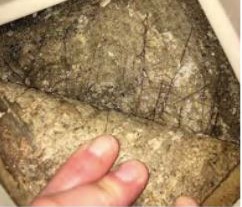
Congress proposes oversight, new rights for service members in privatized housing
Congress is proposing a tenant bill of rights and other provisions to help service members with housing issues.
Military service members may have some more power in their hands when it comes to dealing with management companies overseeing on-base privatized housing.
The recent version of the Senate 2020 defense authorization bill and panel recommendations for the House version of the bill both include provisions to give service members more options to remediate substandard housing conditions.
The legislative language stems from reports of mold, mice and lead paint in military housing managed by private corporations like Balfour Beatty Communities, Corvias Group and Hunt Military Communities. Nearly 1,100 children living in the housing presented with high lead levels in their blood. Other families were sickened by mold in their homes or toxic chemicals in the air and soil of their living areas.
While the military services and the Defense Department are taking some steps to fix the issue, the Senate Armed Services Committee proposed $301.8 million in new funding for 2020 to improve housing safety and oversight.
The Senate 2020 defense authorization bill and the House Armed Services Readiness Subcommittee mark for the House version of the bill require a tenants’ bill of rights for residents of privatized military family housing.
That bill of rights as suggested by the readiness subcommittee is to include:
- A prohibition on reprisal by either the private partner or military chain of command;
- provision of a housing advocate that is not co-located with or employed by the private partner;
- a dispute resolution mechanism;
- a mechanism for withholding rent payments where appropriate during the dispute resolution process;
- prompt provision of maintenance by qualified personnel and effective communication regarding the status of their work orders to include access to an electronic work order management system;
- professional and courteous property management services; and
- information about known and potential hazards at time of home selection, to include mold, lead, rodent infestation and history of sickened residents.
The Senate version of the bill sets up a dispute resolution process and increases oversight. It also instates new quality assurance and control measures and increase health and hazard inspections.
The House Armed Services Readiness Subcommittee recommendations also prohibit the use of non-disclosure agreements in connection with entering into, continuing or terminating a lease.
A House Armed Services Committee staffer told reporters Monday that Congress is most concerned with oversight since the contracts DoD entered into with the companies are 50 years. In order to change the incentive structure or payments DoD would need to renegotiate the contracts with the companies.
“The companies are not saying ‘We can’t renegotiate. We have 50 year contracts,’” Sen. Tim Kaine (D-Va.), who sits on the Senate Armed Services Committee, said on a call with reporters last month. “They are embarrassed and they should be. They are getting into the process of renegotiation. This is another area where the military really dropped the ball. They entered into a 50 year contract, but because privatized housing was a new idea they put in the contract ‘at five years we will renegotiate and reevaluate. It’s a new idea let’s see how it’s working.’ When the five year point came, the military just ran right through the red light. They didn’t stop and say ‘Let’s reassess, let’s take advantage of our right.’”
What DoD is doing
The military services took immediate steps to fix issues reported by service members after the Senate Armed Services Committee held its hearing on the housing issue in February.
The Air Force ordered checks of all 74,000 of its houses. The Navy checked in with all of its sailors in privatized housing and is now conducting a more in-depth survey.
The Army hired 119 additional staff for its housing authorities on installations and put money in its 2020 budget request to sustain those jobs.
The property management companies said they will commit several hundred employees to better manage the houses.
Still, there are families waiting for repairs and who paid out of pocket for fixes and have no recourse for repayment. There are also numerous families with health issues, who are still dealing with medical treatment and bills.
Copyright © 2024 Federal News Network. All rights reserved. This website is not intended for users located within the European Economic Area.
Scott Maucione is a defense reporter for Federal News Network and reports on human capital, workforce and the Defense Department at-large.
Follow @smaucioneWFED





